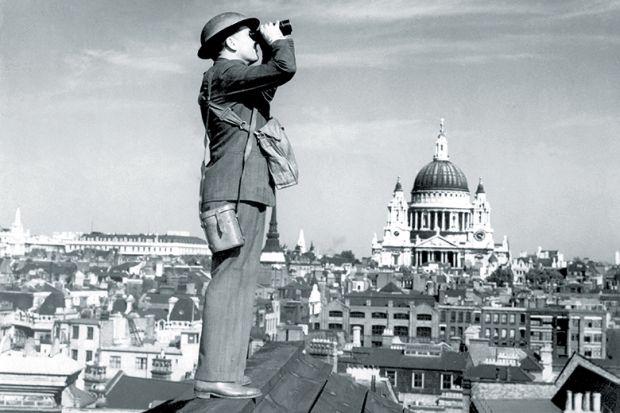Alan Jacobs’ scholarly and subtle The Year of Our Lord 1943 is a history of how, at the turning point of the Second World War, five Christian intellectuals imagined a future peacetime society. His choice is foreseeable but heavyweight: Jacques Maritain, T. S. Eliot, C. S. Lewis, W. H. Auden and Simone Weil (no room here for weirder possibilities such as David Jones or Ithell Colquhoun). They are a motley band, but each thought, in Jacobs’ words: “it possible – and necessary – to restore Christianity to a central, if not the dominant, role in shaping Western societies”. Looking back from 2018, the futility and absurdity of such a desire seem apparent, but it really did not seem so at the time. Indeed, one of the marvels of the book is how Jacobs traces the webs of influence of his five thinkers and shows how seriously they were taken.
They were not homogeneous: their ways of thinking, their audiences and their reception – both now and then – were very different. Weil’s visionary writing and self-denial to the point of starvation could look, as it did to many, both saintly and unhinged; and it is still hard to truly appreciate the post-1939 “American Auden”, rather than the wonders of his 1930s works. But what Jacobs does successfully is to group them around a quest that Eliot articulated: “the effects of industrialism [are] that we become mechanised in mind, and consequently attempt to provide solutions in terms of engineering, for problems which are essentially problems of life”. Modernity, even (or especially) the techno-modernity of radar and fighter jets that might beat the Nazis, is thus seemingly the enemy – which inevitably leads to some agonised contortions in their writing.
The focus on Christian authors who envisage the uses of faith inevitably leads to lacunae. Graham Greene’s The Ministry of Fear is an extraordinary novel of the Blitz, espionage and murder. Also published in 1943, it pursues beliefs and suspicions in a hallucinatory London of moral doubt. Amid the “buildings looking like Pompeii” and the MI6 agents “skinning a house alive” to find microfilm is Arthur Rowe – Greene’s shabby-fearful hero. Jacobs has room for a little bit of The Ministry of Fear and its musings on human responsibility for evil, but not for Greene’s systematic bleakness – or Rowe’s bomb-shocked blankness about the future. For Jacobs’ book is written from a position of faith and a belief in the value of faith; it has an intimacy and confidence of tone, as well as some adventures in the use of the present tense. It also contains certain blind spots such as a lack of attention to recent critical work on Eliot, and its conflation of “England” and “Britain”.
Allan Hepburn’s A Grain of Faith: Religion in Mid-Century British Literature, out later this year, may well prove an interesting counterpoint in a future dialogue about the value of religion across the 1940s. But Jacobs’ findings are intriguing and all the more poignant from a contemporary vantage point in late consumer-capitalism. For, in the midst of war, these writers really thought about immortal souls but also – as Auden has it (and Jacobs quotes): “in 1912, it was a real vision to discover God loves a Pernod and a good fuck, but in 1942 every maiden aunt knows this and it’s time to discover something else He loves”.
Leo Mellor is Roma Gill fellow in English at Murray Edwards College, Cambridge.
The Year of Our Lord 1943: Christian Humanism in an Age of Crisis
By Alan Jacobs
Oxford University Press, 280pp, £20.00
ISBN 9780190864651
Published 27 September 2018
POSTSCRIPT:
Print headline: Let there be light again
Register to continue
Why register?
- Registration is free and only takes a moment
- Once registered, you can read 3 articles a month
- Sign up for our newsletter
Subscribe
Or subscribe for unlimited access to:
- Unlimited access to news, views, insights & reviews
- Digital editions
- Digital access to THE’s university and college rankings analysis
Already registered or a current subscriber? Login







